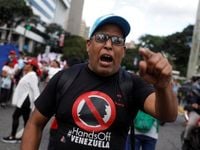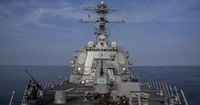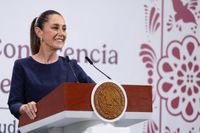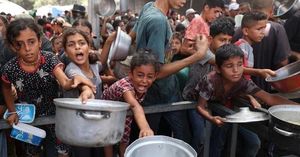The waters off the coast of Venezuela are bracing for a dramatic escalation in U.S.-Latin American tensions, as three United States warships steam toward the southern Caribbean. This deployment, ordered by President Donald Trump, marks one of the most forceful moves yet in Washington’s campaign to curb drug cartels in the region—and to increase pressure on Venezuelan President Nicolás Maduro. With the amphibious squadron, which includes the USS San Antonio, USS Iwo Jima, and USS Fort Lauderdale, expected to arrive by Sunday, August 24, 2025, the world is watching to see what comes next.
According to Reuters, these warships are carrying approximately 4,500 U.S. service members, including 2,200 Marines, in what the Pentagon describes as a bid to counter the trafficking of fentanyl and cocaine blamed for fueling violence in American cities. While the Pentagon has kept the squadron’s specific mission under wraps, two sources briefed on the plans confirmed to Reuters that the ships are en route and could reach Venezuelan waters by the weekend. The move comes on the heels of a major policy push by the Trump administration, which has doubled down—literally—on its efforts to bring Maduro to justice.
Just last month, the U.S. doubled its reward for information leading to Maduro’s arrest to a staggering $50 million, according to AFP and Al Jazeera. Washington accuses Maduro of heading the notorious Cartel de los Soles, or “Cartel of the Suns,” a group it claims is deeply entrenched in cocaine trafficking. In a further escalation, the U.S. Treasury has designated the Cartel de los Soles, Venezuela’s Tren de Aragua, and Mexico’s Sinaloa cartel as foreign terrorist organizations. These moves are part of a broader U.S. narcotics strategy, which, as AP notes, also includes extending terrorist designations to Latin American groups such as MS-13 and several Mexican organizations as of February 2025.
White House Press Secretary Karoline Leavitt made the administration’s stance crystal clear. “President Trump has been very clear and consistent, he’s prepared to use every element of American power to stop drugs from flooding into our country and to bring those responsible to justice,” she told reporters. Leavitt went on to assert, “Maduro, it is the view of this administration, is not a legitimate president; he is a fugitive head of this cartel who has been indicted in the United States for trafficking drugs into this country.”
The U.S. government’s actions have not gone unnoticed in Caracas. In a televised address on August 18, 2025, Maduro condemned what he called “threats” from Washington and announced the mobilization of more than 4.5 million militia members across Venezuela. “This week, I will activate a special plan with more than 4.5 million militiamen to ensure coverage of the entire national territory – militias that are prepared, activated and armed,” Maduro declared. The Venezuelan leader also ordered a temporary ban on all aerial drone operations for 30 days, a move widely interpreted as preparation for a possible aerial attack.
Maduro’s government has pushed back hard against the U.S. narrative. Venezuela’s Foreign Minister Yván Gil dismissed the American accusations, stating they “expose its lack of credibility and the failure of its policies in the region.” The Maduro administration continues to insist that the U.S. is using the drug trafficking issue as a pretext for political intervention and regime change.
On the ground in Venezuela, the mood is tense but defiant. Supporters of Maduro have taken to the streets in Caracas, waving flags and vowing to defend their president against what they perceive as foreign aggression. The mobilization of millions of militia members is being portrayed by state media as a patriotic response to external threats, while opposition groups remain skeptical of both the government’s motives and the likelihood of a U.S. military intervention.
According to Al Jazeera’s Latin America editor Lucia Newman, the Trump administration’s aggressive tactics are causing unease far beyond Venezuela’s borders. “President Trump’s vow to send warships to the Caribbean and elsewhere in Latin America to stop the flow of drugs to the United States is being seen as more than just a threat to Venezuela. It could apply to many, many countries in this region,” Newman reported. She added, “They say today it may be Venezuela, tomorrow it could be any one of them.”
This sentiment is echoed by regional analysts, who warn that the U.S. strategy—while focused for now on Venezuela—could easily be extended to other Latin American countries. There is growing concern that the U.S. is willing to use military force in its own backyard, even as it presents itself as a global peacemaker on other fronts. As one observer put it to Al Jazeera, many are wondering why Trump has chosen “such an aggressive move in the United States’ backyard while he portrays himself as a global peacemaker.”
The broader context is one of escalating frustration in Washington over the continued flow of narcotics into the United States, with fentanyl and cocaine at the center of the crisis. The Trump administration’s answer has been to deploy not just law enforcement, but also the U.S. military, in hopes of disrupting the networks that supply these drugs. The designation of Latin American cartels as foreign terrorist organizations is intended to give the U.S. broader legal authority to act against them, both at home and abroad. But critics argue that such moves risk destabilizing already fragile countries and could backfire by fueling anti-American sentiment.
For now, the world waits to see how Maduro will respond to the arrival of U.S. warships just off his nation’s coast. The Venezuelan leader’s decision to mobilize millions of militia members and ban drones suggests he is bracing for the worst. Yet, the specific intentions of the U.S. squadron remain officially undisclosed, leaving room for speculation—and anxiety—on both sides of the Caribbean.
One thing is certain: this latest chapter in U.S.-Venezuela relations has upped the ante, with both governments digging in and preparing for a confrontation that could have ripple effects throughout Latin America. As the ships draw closer and the rhetoric intensifies, all eyes are on the Caribbean, waiting to see whether this standoff will remain a war of words or escalate into something far more dangerous.






